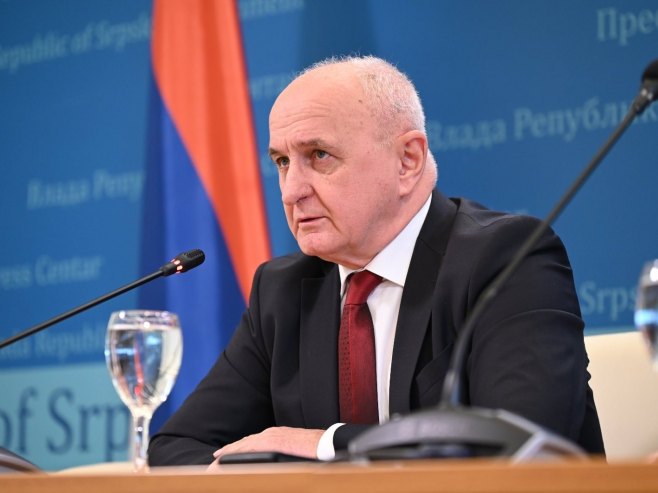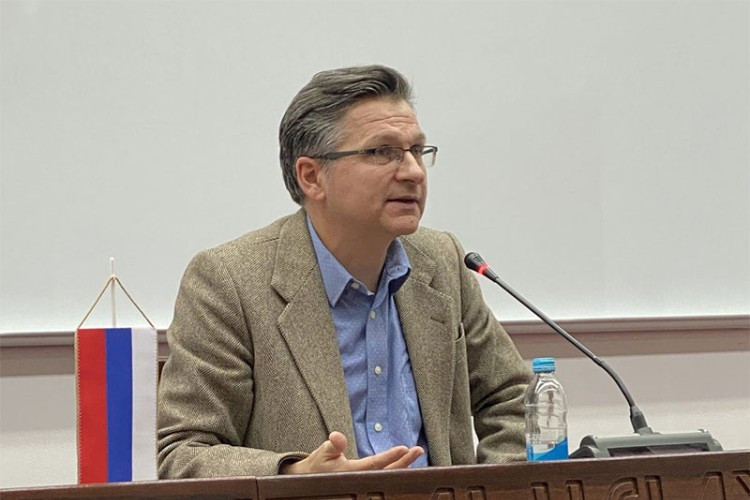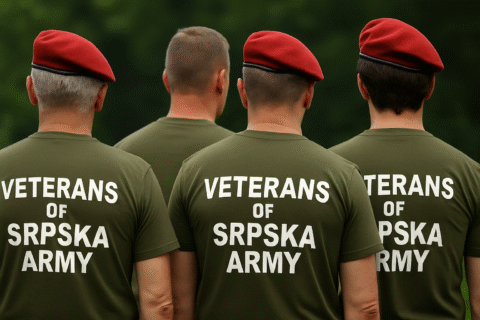Historian Miloš Ković believes that Serbs must shed light on the long history of genocide against the Serb people, which has persisted throughout the entire 20th century and can be recognized in earlier epochs as well, including during the Austro-Hungarian rule in Bosnia and Herzegovina, which spanned the late 19th and early 20th centuries.
Ković believes that Serbs can use the resolution on Srebrenica, whose adoption is being prepared in the UN General Assembly, at least to show that the label of a genocidal nation, as proposed by its proponents, applies to those who committed genocide against Serbs.
“It is important that we are forced, even by this shameful resolution, which I call a genocidal resolution because it is submitted by those who committed crimes against the Serb people, and they continue to do so today, to shed light on this long history of genocide against Serbs, which continues into our time. Because what is happening to Serbs in Kosovo and Metohija, according to the definitions of that term, can only be called genocide,” Ković said.
Highlighting that proving genocide in a certain area depends on the definition used, Ković explains that the definitions of genocide from 1948, provided by the UN, and the definition by the term’s creator, Raphael Lemkin, from 1944, are most commonly used here.
“These are very broad definitions. But what happened to Serbs in World War I fully corresponds to the definitions of genocide given in 1948 and 1944,” Ković said.
He noted that when discussing the extermination of Serbs in Bosnia and Herzegovina during Austro-Hungarian rule, it should be kept in mind that the definition of genocide from 1944 implies the destruction of the foundations of the existence of a people, which are cultural and economic bases.
“This was done during the time of Austro-Hungarian rule, or the regime of Benjamin Kallay in Bosnia and Herzegovina when the official existence of the Serbian people was abolished. The only people officially existing in Bosnia and Herzegovina were called ‘Bosnians.’ There was only a Bosnian nation, and Serbs did not exist in the public sphere,” Ković emphasized.
He explained that at that time, someone could be a Serb only in the private sphere – in their family and home, and officially, that people were called “Bosnians,” as was their language, because Serbian officially did not exist.
FROM MILITARY COURTS FOR CIVILIANS TO LYNCHINGS
Ković claims that during World War I, there was a direct, massive, and genocidal crime against the Serbian people in Bosnia and Herzegovina when Austria-Hungary established military courts that tried civilians.
“What began as a treasonous, so-called Zagreb process against Serbs in 1909, which was fabricated, continued with a series of trials in Bosnia and Herzegovina, such as the Banja Luka trial, which was the largest. Serbs were tried there simply because they were Serbs. They were tried as ‘traitors’ because they were more loyal to Serbia and Montenegro than to Austria-Hungary,” Ković pointed out.
In addition to trials that were a mockery of judicial proceedings, Serbs were directly killed at their doorstep, and they were killed by Austro-Hungarian volunteers, so-called “Schutzkorps,” whom academician Milorad Ekmečić called the forerunners of the Ustaše.
“Serbs were hanged and killed in the most brutal ways at their doorstep. The entire Podrinje region, from Herzegovina to Semberia, was littered with Serb killing fields. Of course, that wasn’t all, because Serbs were taken to concentration camps, and the most well-known concentration camps for Serbs from Bosnia and Herzegovina were in Doboj and Arad,” Ković noted.
AUSTRO-HUNGARIAN CRIMES WERE ALSO SILENCED IN THE KINGDOM OF YUGOSLAVIA
He believes that it is particularly important for the Republic of Srpska, concerning the Doboj camp, to properly mark the sites and thoroughly study the history of that camp, where Serbs from Montenegro were also held.
“Of course, commemoration and remembrance of the victims in Arad, Jindřichovice, and Mauthausen, Nadjmeđer, and other camps in the Austro-Hungarian territories are necessary. There, Serbs died from torture, hunger, and disease. They had no medical care, and thousands died,” Ković emphasized.
He pointed out that this is a history that has not been told because very little has been written about it, and we only have Vladimir Ćorović’s work, “The Black Book.”
“Ćorović addresses the crimes against Serbs in Bosnia and Herzegovina, in today’s Republic of Srpska, and in the rest of Bosnia and Herzegovina in that book. Apart from that, very little has been written comprehensively about it. These crimes were mostly silenced even in the Kingdom of Yugoslavia,” Ković noted.
THE SAME CRIMINALS KILLED IN 1914 AND 1941
More has been written, as Ković says, about the genocidal crimes of the Austro-Hungarian army on Serb territory, especially in the regions of Mačva, Jadra, and Rađevina, where entire villages were annihilated.
“The same criminals from 1914, who committed crimes in these areas then, returned in 1941, and sometimes they were the same people
. In the wider area of Loznica, in the villages of Draginac and Cikote, even babies in cradles were killed. These were reprisals because of the Serbian uprising in 1941, but the excuse is not important because it was about mass crimes,” Ković emphasized.
He believes that it should always be remembered that Serbs are a nation of concentration camp victims because they were taken to concentration camps where they died en masse in both World Wars, and it can be said that Serbs, along with Ruthenians, were the first Europeans to be imprisoned in concentration camps.
“And that is the history of genocide against the Serb people that continues throughout the entire 20th century, and which, as stated in the Easter message of the Serbian Orthodox Church, can be traced in previous centuries as well. In the history of that genocide, a special place is occupied by the genocide in World War I. Academician Ekmečić wrote that this genocide began in 1914 with crimes against civilians in the vicinity of Foča,” Ković concluded.
Source: RTRS









